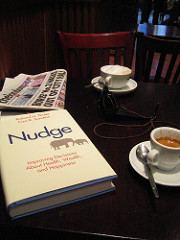
Let’s Be Safe
Following last month’s look at personal security on the net, David Guest, sees what’s on offer for North Coast practices.
“The Internet, the last frontier: where men are men
and women are men, and 14 year old schoolgirls are FBI agents.”
When the internet was being designed over 30 years ago, it was envisaged that it would be a glorious utopia where one would be able to communicate with friends and family on the other side of the world in seconds. The vision came true. Text only emails are passé now. Video conferencing with several family members is also old hat. (NBN permitting.)
What was not expected was the number of people trying to use your information for nefarious purposes. The potential to be hacked is a serious risk for everybody on the net and has spawned several billion dollar industries.
- Details
- Written by: David Guest

After Hour Docs Respond to Nudging
The Federal government’s concerns about the rapidly rising cost of after-hours home visits by medical practitioners has led to using the increasingly popular ‘nudge theory’ in an attempt to change the behaviour of doctors making the highest number of claims.
The issue of rising budgetary costs - highlighted previously in GP Speak - is one of the issues being considered by the government’s clinician-led Medicare Benefits Schedule Review Taskforce. The review has recommended that after-hours billing should only be allowed by GPs who normally work during the day and are recalled to work for management of patients needing urgent assessment.
Nudge theory is a concept in behavioural science that employs positive reinforcement and subtle messaging to seek compliance with desirable government policies or social strategies.
- Details
- Written by: Robin Osborne

Time to stop subsidising nicotine replacement therapies?
Nicotine replacement therapy has been portrayed as the best way to wean smokers off their habit. But as Simon Chapman, Professor of Public Health, University of Sydney, explains, NRT is not the cure-all it has been cracked up to be.
Nicotine replacement therapy (NRT) became available in Australia in 1984 (gum) and 1993 (patches), first as prescription-only items. From 1988, they started becoming available as an over-the-counter item, with patches available without prescription from 1997. Today, some forms of NRT can even be bought in supermarkets.
If prescribed, NRT attracts a government subsidy. In the 17 months from July 2013 to Dec 2014, data provided by the Department of Health show 199,818 NRT scripts cost the government A$8,617,804.
But 31 years later, what should governments do if data show that NRT is little better, or even a good deal worse, at helping smokers quit than if they try to do it cold turkey?
- Details
- Written by: Professor Simon Chapman,
Read more: Time to stop subsidising nicotine replacement therapies?

My Health Record - Can we make it better?
Australian health researchers are investigating the use of the Australian Government's My Health Record (MyHR). They are using an online survey to better understand Australian medical practitioners (GPs and Specialists), practice nurses and practice managers' use and views of the MyHR.
Chief clinical investigator, Associate Professor Bronwyn Hemsley from the University of Newcastle, has a long standing interest in the use of internet technologies to improve patient care and hopes the research will elucidate the barriers to more effective use of the MyHR.
The survey takes under 10 minutes to complete and has 5 demographic questions, followed by 12 MyHR questions. Participation is private and confidential.
The research is funded by the National Health and Medical Research Council of Australia and has Ethics Approval Number H-2014-0041.
The survey closes on 22 January 2018.
- Details
- Written by: University of Newcastle - Clinical Investigators

The myths and challenges of smoking cessation
“James Packer takes a deep draw of his menthol cigarette and for a few moments stares out the window at the lush polo field…”
- Damon Kitney, “I was terrified”, Weekend Australian Magazine, Oct 21-22 2017.
Among the many misconceptions that smokers have about their habit is that weaker/milder cigarettes are “better”, although there is no evidence for this. Indeed, they can be worse because of increased inhaling to build up nicotine levels. As for mentholated cigarettes - first developed by Lloyd "Spud" Hughes of Mingo Junction, Ohio in 1924 - evidence shows that the cool (or ‘Kool’) ingestion of menthol causes an increased metabolism of nicotine.
Regardless of the scientific evidence about the damage that smoking causes to human health - the practice has a 68% death rate, a statistic that few smokers are aware of - there are many myths about consumption, and even more challenges about quitting.
- Details
- Written by: Andrew Binns
Page 104 of 177















